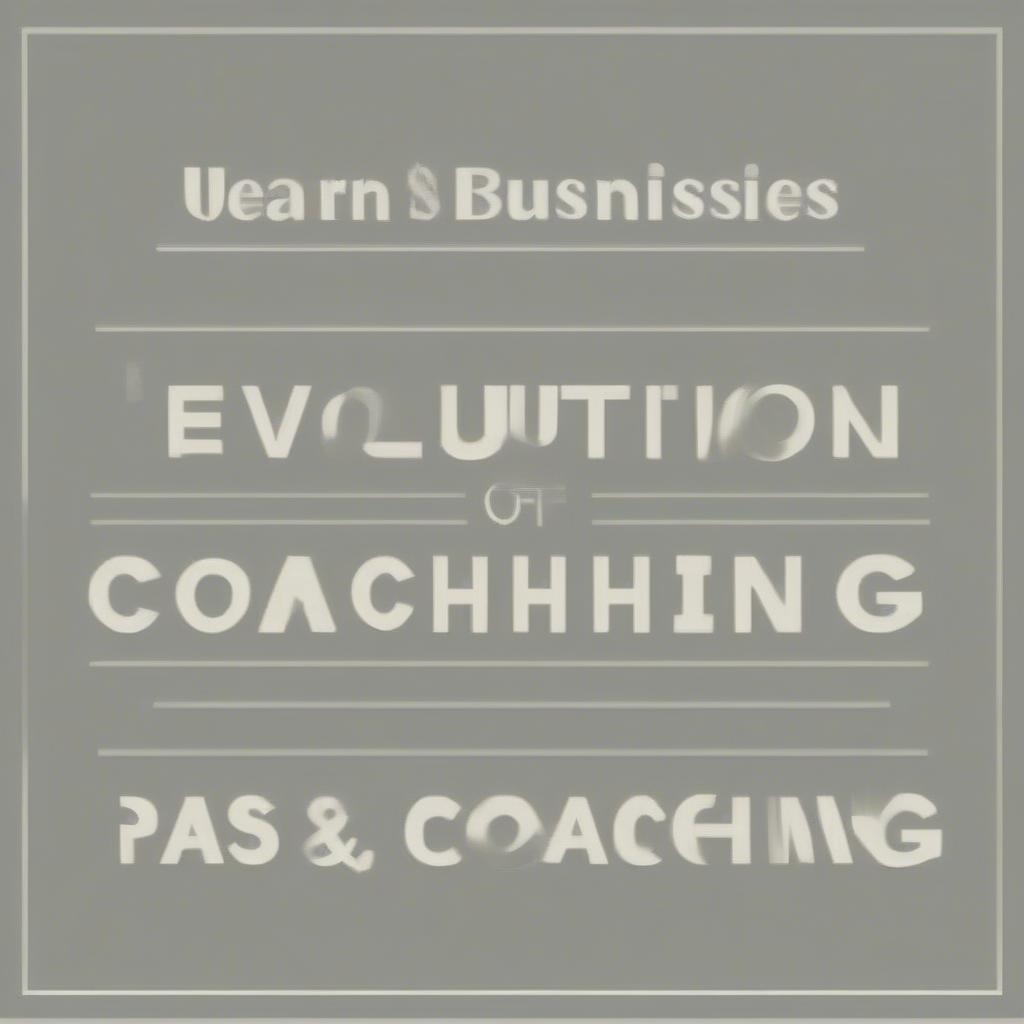
Growing a coaching business beyond its initial stages can feel like navigating a labyrinth. You’ve poured your heart and soul into helping clients, and now you’re ready for business expansion and to reach more people. The good news is, with the right strategies, this is absolutely achievable. This article will serve as your comprehensive guide, providing practical, actionable steps to successfully scale your coaching business.
Understanding the Foundations of Scaling Your Coaching Business
Before we delve into the "how," let’s solidify the "why" and "what." Scaling isn’t just about making more money; it’s about maximizing your impact and creating a sustainable business that can serve a wider audience.
What Does Scaling Really Mean?
Scaling your coaching business means increasing your capacity to serve more clients and generate more revenue without proportionally increasing your workload. It’s about working smarter, not just harder. It’s about building systems, leveraging technology, and creating a repeatable process that allows you to expand your reach and impact efficiently.
Why Is Scaling Important for Coaches?
- Increased Impact: Scaling allows you to touch more lives and make a bigger difference in the world. It’s about going beyond individual sessions and creating a movement.
- Financial Freedom: A scalable business provides more financial security and allows you to earn income in a more leveraged way.
- Time Freedom: By implementing systems, you free up your time, allowing you to focus on the aspects of your business that you truly love and excel at.
- Sustainability: A well-scaled business can weather market fluctuations and continue to grow for years to come.
- Personal and Professional Growth: The process of scaling pushes you to grow as an entrepreneur, improving your skills in leadership, management, and business strategy.
Knowing When You’re Ready to Scale
The desire to scale is common, but knowing when you’re ready is crucial. Here are some signs to consider:
- Consistent Client Flow: You have a consistent stream of clients, indicating that your coaching services are in demand.
- Solid Foundations: You have established systems for client onboarding, coaching sessions, and payments.
- Clear Niche: You have identified and honed in on a specific niche, allowing you to tailor your services effectively.
- Positive Client Feedback: You have consistently received positive feedback from your clients, showcasing the value you provide.
- Time Constraints: You’re often fully booked, and feel your current capacity is limited, this signifies you need coaching business growth.
- Desire for Expansion: You feel ready to reach more people and have the energy and ambition to scale.
If these factors resonate with you, it’s time to explore how to scale your business effectively.
Key Strategies for Scaling Your Coaching Business
Now, let’s dive into the actionable steps you can take to scale your coaching business and achieve significant business expansion.
1. Leverage Your Time with Group Coaching
One of the most effective ways to scale is to shift from one-on-one coaching to group coaching.
- Benefits of Group Coaching:
- Serve More Clients Simultaneously: You can help multiple clients at once, multiplying your impact and revenue.
- Create a Community: Group coaching fosters a sense of community among participants, enhancing their experience and motivation.
- Leverage Your Expertise: You can share your knowledge with a wider audience in a single session, reducing your active coaching time.
- Increase Revenue: Group programs allow you to earn more income per session compared to individual sessions.
- Scalability: It’s easier to increase the size of your group sessions without drastically changing your workload.
- How to Implement Group Coaching:
- Identify a Theme: Choose a specific topic that is in high demand among your target audience.
- Structure Your Program: Develop a curriculum with clear learning objectives, modules, and activities.
- Set a Price: Determine the appropriate pricing based on the value you provide and your desired income.
- Market Your Program: Promote your group coaching program through your website, social media, and email list.
- Deliver Exceptional Value: Ensure that your group coaching sessions are engaging, interactive, and results-driven.
- Example: Instead of offering individual career coaching sessions, you could create a 6-week group program focused on “Building a Successful Career Strategy,” priced at a premium but available to 15-20 participants.
2. Create and Sell Online Courses
Transform your knowledge into scalable assets by creating and selling online courses.
- Benefits of Online Courses:
- Passive Income: Courses can generate income while you sleep, reducing your reliance on active coaching time.
- Reach a Global Audience: Online courses can be accessed from anywhere in the world, expanding your reach.
- Establish Authority: Creating a course positions you as an expert in your field.
- Flexible Learning: Students can learn at their own pace and on their own schedule.
- Scalability: Once the course is created, it can be sold multiple times without extra effort.
- How to Create and Sell Online Courses:
- Choose a Topic: Select a topic you’re passionate about and your audience is interested in.
- Plan Your Content: Outline the modules, lessons, and exercises for your course.
- Record Your Videos: Use high-quality equipment and focus on delivering clear and engaging content.
- Choose a Platform: Select a course platform (e.g., Teachable, Thinkific, Kajabi) that suits your needs.
- Market Your Course: Promote your course through your website, email list, and social media.
- Provide Support: Offer ongoing support to your students through Q&A sessions, forums, or email.
- Example: If you specialize in productivity coaching, you could create an online course on “Time Management for Entrepreneurs” that includes video lessons, downloadable worksheets, and templates.
3. Develop a Membership Program
A membership program provides recurring revenue and fosters a strong community around your coaching services.
- Benefits of a Membership Program:
- Recurring Revenue: Provides a predictable and consistent income stream.
- Build a Community: Creates a loyal and engaged group of customers.
- Enhanced Customer Relationships: Fosters closer connections with your clients.
- Scalability: Easier to manage than one-off individual coaching.
- Value for Members: Provides ongoing support, resources, and community interaction.
- How to Build a Successful Membership Program:
- Choose a Theme: Determine the main topic or focus of your membership.
- Offer Diverse Content: Provide a mix of live sessions, pre-recorded content, tools, templates, and community interaction.
- Tier Your Membership: Create different membership levels to accommodate varying budgets and needs.
- Set a Price: Price your membership at a rate that offers value while aligning with your income goals.
- Promote Your Membership: Market your membership on your website, social media, and email list.
- Engage with Your Members: Regularly interact with your members through forums, live Q&A sessions, or personalized messages.
- Example: A health and wellness coach could offer a membership with monthly live Q&A sessions, workout videos, meal plans, and a supportive community forum.
4. Optimize Your Sales Funnel
A well-optimized sales funnel ensures that potential clients move seamlessly from awareness to becoming paying customers.
- Key Elements of a Sales Funnel:
- Lead Capture: Attract potential clients through free resources, such as ebooks, checklists, or webinars.
- Landing Pages: Create dedicated pages to capture leads and promote your coaching services.
- Email Marketing: Build an email list and nurture leads with valuable content and offers.
- Sales Pages: Develop compelling sales pages that clearly articulate the benefits of your coaching.
- Client Onboarding: Streamline the process for new clients to get started smoothly and seamlessly.
- How to Optimize Your Sales Funnel:
- Analyze Your Current Funnel: Identify the weak points in your current sales process.
- Improve Your Landing Pages: Make sure your landing pages are clear, concise, and have a strong call to action.
- Refine Your Email Sequences: Create automated email sequences that nurture leads and guide them toward a purchase.
- Enhance Your Sales Pages: Highlight the value proposition and address potential objections.
- Streamline Client Onboarding: Make it easy for new clients to sign up and start their coaching journey.
- Example: Use a free checklist related to your coaching niche to capture emails, follow up with an automated email sequence that introduces your coaching services, and provide a clear call to action to book a consultation.
5. Automate Processes and Systems
Automation is key to reducing your workload and scaling efficiently.
- Tools and Systems to Automate:
- CRM (Customer Relationship Management): Manage client data, track interactions, and automate communication.
- Email Marketing Software: Automate email sequences, newsletters, and follow-up messages.
- Scheduling Tools: Automate appointment booking and scheduling.
- Payment Processors: Automate invoice creation and payments.
- Project Management Tools: Organize tasks, track progress, and collaborate with team members.
- How to Automate Your Coaching Business:
- Identify Repetitive Tasks: Determine which tasks are time-consuming and can be automated.
- Choose the Right Tools: Select software that meets your specific needs and budget.
- Set Up Automation: Configure your tools to automate tasks such as email follow-ups, client onboarding, and scheduling.
- Monitor and Optimize: Regularly review your automated systems and make adjustments as needed.
- Example: Use a CRM system to automate sending welcome emails to new clients, scheduling consultation calls, and tracking client progress.
6. Build a Strong Team
As your business grows, you may need to delegate tasks to other professionals.
- Roles You Might Consider:
- Virtual Assistant: Handle administrative tasks, scheduling, and email management.
- Marketing Specialist: Manage social media, content creation, and marketing campaigns.
- Sales Support: Assist with lead generation, follow-up, and client onboarding.
- Tech Support: Manage technical aspects of your website, online courses, and software.
- How to Build a Strong Team:
- Identify Your Needs: Determine which areas of your business need the most support.
- Hire the Right People: Recruit professionals who align with your values and business goals.
- Train Your Team: Provide thorough training and ongoing support.
- Delegate Effectively: Delegate tasks based on skills and expertise.
- Communicate Regularly: Maintain clear and open communication with your team.
- Example: Hire a virtual assistant to manage your schedule, respond to inquiries, and handle social media posts, freeing up more of your time for coaching and business development.
7. Focus on Content Marketing
Content marketing is essential for attracting new clients and establishing yourself as an authority in your niche.
- Effective Content Marketing Strategies:
- Blog Posts: Share valuable insights, tips, and strategies on your blog.
- Videos: Create engaging videos for YouTube, social media, and your website.
- Podcasts: Share your expertise through audio content.
- Social Media: Build a strong presence and engage with your audience on relevant platforms.
- Free Resources: Offer free ebooks, checklists, and templates in exchange for email addresses.
- How to Implement Content Marketing:
- Identify Your Target Audience: Understand the needs, challenges, and interests of your ideal clients.
- Plan Your Content Calendar: Create a schedule for publishing content regularly.
- Create High-Quality Content: Focus on providing valuable and engaging content that resonates with your audience.
- Promote Your Content: Share your content on social media, email, and other relevant channels.
- Analyze Your Results: Track your performance and make adjustments as needed.
- Example: Regularly publish blog posts and videos on topics related to your coaching niche, and promote your content on social media to attract new clients.
8. Gather Feedback and Iterate
Continuously seek feedback from your clients and use it to improve your services.
- Methods to Gather Feedback:
- Client Surveys: Use online surveys to collect feedback about your coaching sessions.
- Feedback Forms: Provide feedback forms after each session or module.
- Informal Conversations: Have open conversations with your clients to get their input.
- Testimonials: Gather testimonials to showcase the value you provide.
- Social Media Interactions: Monitor comments and engagement on social media to understand client preferences.
- How to Use Feedback to Improve:
- Analyze the Feedback: Identify patterns and areas for improvement.
- Implement Changes: Make necessary changes to your coaching approach, content, or delivery.
- Monitor the Results: Track the impact of your changes and make further adjustments as needed.
- Show Appreciation: Acknowledge and thank clients for their feedback.
- Example: Use feedback from client surveys to improve the content and structure of your coaching programs.
The Role of Learn Business in Your Scaling Journey
At Learn Business, we understand the challenges coaches face when growing their business. We’re committed to supporting you with practical guidance and essential tools to streamline your processes and accelerate your business expansion.
How Learn Business Supports Your Coaching Business
- Tailored Templates: Our platform offers a variety of customizable templates specifically designed for coaches, including:
- Client Intake Forms: Collect crucial client information efficiently.
- Coaching Session Outlines: Structure your sessions for maximum impact.
- Progress Tracking Sheets: Monitor client progress and identify areas for improvement.
- Sales Pages and Email Templates: Create professional and engaging sales materials.
- Expert Guidance: We provide step-by-step guidance on how to implement scaling strategies effectively.
- Community Support: Connect with a community of like-minded coaches, share experiences, and learn from others.
- Business Planning Resources: Access tools and resources to create a solid business plan that aligns with your scaling goals.
- Tech Guidance: We offer resources and recommendations for selecting the best tech tools and platforms for your coaching business.
Final Thoughts on Scaling Your Coaching Business
Scaling a coaching business is a journey, not a destination. It requires consistent effort, strategic planning, and a willingness to adapt. By implementing the strategies outlined in this article, focusing on automation, and continually seeking feedback, you can create a thriving, scalable business that impacts countless lives. Remember to leverage the resources offered by Learn Business to streamline your processes and confidently navigate your business expansion. Your expertise is valuable, and with the right approach, you can reach more people and make an even bigger difference in the world. Don’t be afraid to start small, learn as you go, and celebrate your successes. Your journey to a scaled, successful coaching business is within reach.



Leave a Reply